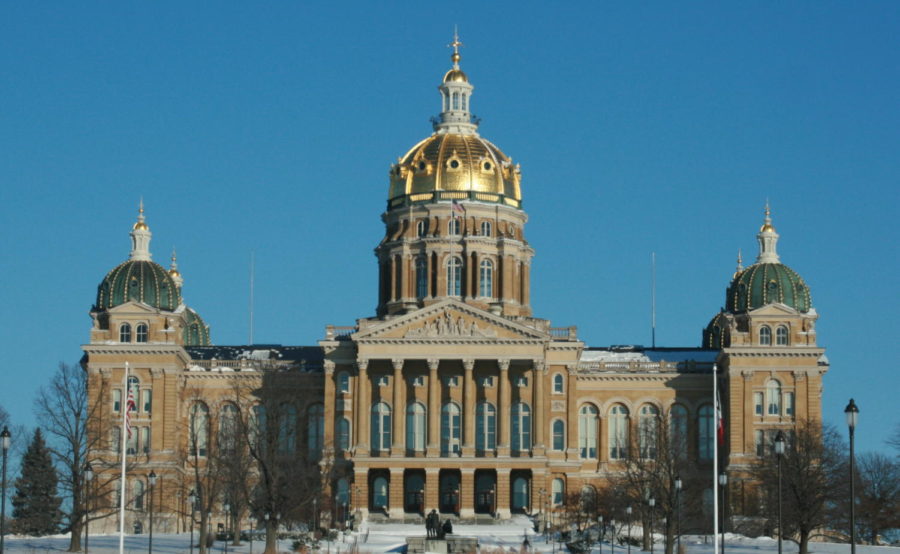The political side of name, image, likeness rights
Iowa’s state capitol in Des Moines, Iowa
April 29, 2022
The advent of name, image, likeness rights last year has shaken up the college sports world, but it is just as much a political issue as it is a sports issue.
Name, image, likeness refers to rights of college athletes to profit off the use of their name, image or likeness. This was previously against the NCAA’s rules but was authorized on July 1, 2021 after being a contentious issue for many years.
Cyclone athletes such as Brock Purdy and Izaiah Brockington began signing deals with companies like Cameo, a custom video service, last year. However, name, image, likeness became a much bigger deal for the state of Iowa when Iowa State’s Tyrese Hunter, an open-option freshman in LAS, entered the transfer portal, reportedly for name, image, likeness opportunities.
Before the NCAA removed their ban on name, image, likeness, two Iowa lawmakers had proposed a bill to guarantee those rights for Iowa’s athletes. Senators Nate Boulton (D-Des Moines) and Brad Zaun (R-Urbandale) proposed the bill last year after meeting with several Iowa college athletes such as Jordan Bohannon, Caitlin Clark and Adam Emmenecker.
Boulton said the NCAA had ignored big changes in college athletics, and the old system was unsustainable.
“It has resulted in very high coaches salaries, facilities investments and all this money being captured around the college athlete, but those resources being specifically kept away from college athletes,” Boulton said.
Iowa State Athletic Director Jamie Pollard said on “The Murph and Andy Show” that the athletic department would not be involved in NIL deals; although, in an email interview, he said he supports name, image, likeness rights.
“I believe it is important that student-athletes have the same rights as students to be able to use their own name, image and likeness,” he said.
Boulton and Zaun’s bill made it through a subcommittee and committee in the state Senate and would’ve made the NCAA’s policies illegal in the state of Iowa, but since the NCAA dropped their own restrictions, the bill is no longer necessary.
However, there could be future legislation regarding name, image, likeness. Boulton said there may be a need for laws regulating those interested in capitalizing on name, image, likeness.
“I don’t know if it will be state or on a national level, but I do think there are things that ought to be done to continue to protect student athletes,” Boulton said. “One of the things is establishing some rules of the road in terms of agency relationships.”
As it stands, agents don’t need any certification to work with student athletes, and there is no cap on how much money an agent can charge an athlete for facilitating name, image, likeness deals. Boulton said this needs to be regulated in the interest of protecting student athletes.
“I think as we watch this system develop, there are gonna be more things that we look for to make sure we’re doing our job as a state to protect our college athletes and make sure their rights, their interests are not lost and avoid abusive practices from playing out,” Boulton said.
Pollard also sees risks for college athletes when navigating name, image, likeness ventures.
“That is why we have partnered with the Iowa State College of Business to provide educational workshops to our student-athletes so they can learn about contracts, marketing, rights, etc.,” Pollard said.
Pollard also said he thinks that future legislation could help prevent athletes from being exploited.
“…Potentially at the Federal level where it could all be the same. Leaving it up to the states only brings into play further differences and confusion,” Pollard said.

















